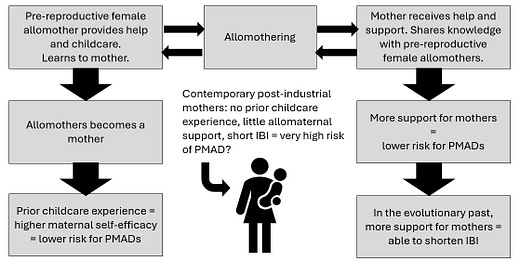This is a very proud moment for me. After MONTHS of work, together with my collaborator Dr. Molly Fox, a professor of biological anthropology at UCLA, our paper, Lonely, stressed-out moms: Does the postindustrial social experience put women at risk for perinatal mood disorders?, is finally published in the journal of Evolution, Medicine, & Public Health!! AND it’s open-access, so anyone can read it for free (just click here). We really tried to make the language more accessible than is typical for academic papers because I want this to be read and shared far and wide by people outside of academia, but if digesting a long academic paper is too much for you right now (I get it) here’s the lay summary.
The figure below sums it up pretty nicely.
Basically, our hypothesis is that the high rates of postpartum depression (and other perinatal mood disorders) that we are seeing around the world today can be largely explained by a mismatch between the environment in which we evolved to mother and the contemporary post-industrial (or post-agricultural) experience. The social context in which humans evolved to mother includes three key components that are all largely absent from our modern lives:
Mothers spaced their children further apart. Human hunter-gatherers have an average interbirth interval that is closer to 4 years. Modern Americans have an average interbirth interval of only 3 years and 30% of mothers have interbirth intervals of less than 27 months (2 years and 3 months).
Mothers got tons of help from the community, starting on day 1. Humans lived in social groups of 25-30 people (related and unrelated) and babies were cared for collectively. Babies could have as many as 14 different caretakers in a single day. Toddlers were often cared for by older children in the context of a multi-age playgroup while the mother went foraging.
Pre-reproductive girls had lots of hands-on parenting experience prior to becoming mothers. Prior childcare experience increases a mother’s self-confidence in her ability to mother (much more than books). Lack of self-confidence is often associated with PPD, as is a mismatch between motherhood expectations and reality (which is a higher risk for mothers who have no significant prior experience with babies and children).
These factors are all interrelated because the social nature of child-rearing is probably what allowed mothers to evolve shorter interbirth intervals relative to our last common ancestor with the great apes (Chimpanzees have an interbirth intervals of 5 years and Orangutans have an interbirth interval of 8 years). Also, when girls (and boys, for that matter) helped their mothers with childrearing, not only did this relieve the burden of care for mothers, but the helpers learned valuable parenting skills that they could draw on later in life.
Today, in post-industrial societies, most mothers are coming into motherhood with little to no prior experience with babies, we are spacing our children closer together than would have been normal in our evolutionary past, and we are caring for them with relatively little social support. Our argument (Dr. Fox and I) is that this is the perfect recipe for post-partum depression and related disorders.





This is brilliant and such important work!
Thank you!! Loved reading it!
Do you have a layman version of this btw? I didn't fully understand it 😅